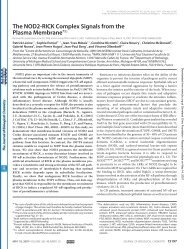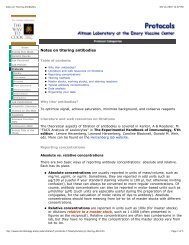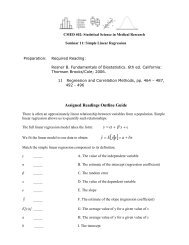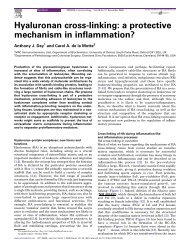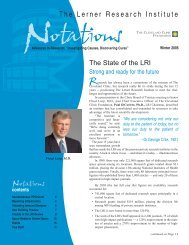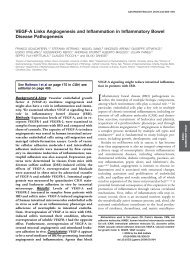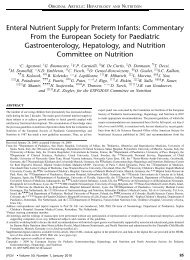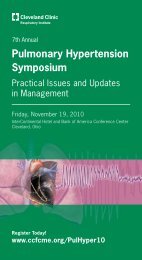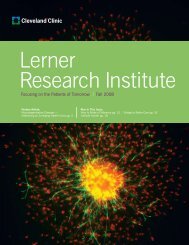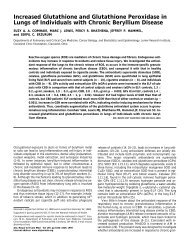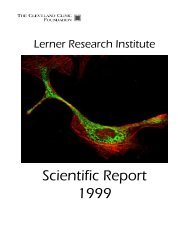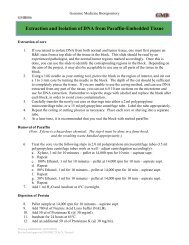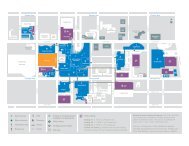Scientific Report 2003-2004 - Cleveland Clinic Lerner Research ...
Scientific Report 2003-2004 - Cleveland Clinic Lerner Research ...
Scientific Report 2003-2004 - Cleveland Clinic Lerner Research ...
- No tags were found...
Create successful ePaper yourself
Turn your PDF publications into a flip-book with our unique Google optimized e-Paper software.
Our laboratory focuses on understanding thecellular and molecular immunologic eventsinvolved in rejection and tolerance ofallogeneic organ grafts. Despite significant progressin the development of medications and therapiescapable of preventing rejection of organ transplants,acute rejection episodes,with their concomitantmorbidities, remain a clinicalproblem. Perhaps moreimportantly, chronic rejectionleads to organ failure in a largeproportion of transplantrecipients 5-10 years posttransplant surgery.Our laboratory usesanimal models to delineate themechanisms involved in acuteand chronic transplant rejectionand to further determine themechanisms that mediatetolerance to transplanted organs.We have an additional interest indeveloping and testing clinicallyrelevant, immune-basedprocedures for identifyinghuman organ transplant recipients at high risk ofincipient organ failure.Studies funded through the NationalInstitutes of Health (NIH) evaluate mechanisms ofallograft rejection in mouse models using skin andheterotopic cardiac allografts, with a particularemphasis on indirect allorecognition by T cells. Wehave demonstrated that T cells responding todonor-derived peptides expressed by recipientantigen-presenting cells can mediate a chronic formof skin graft rejection, despite an inability torecognize any antigen expressed on the graft cellsthemselves. Studies in a model of heart transplantationsuggest that this “indirect pathway” is animportant mediator of graft fibrosis and chronicrejection. Ongoing studies are focused onunderstanding the molecular mechanisms of theseeffects so as to be able to ultimately design specifictherapies for preventing or treating this disease. Aspart of these studies, we have developed andcharacterized a state-of-the-art, computer-assistedELISPOT assay, capable of detecting cytokineproduction by individual alloreactive T lymphocytes.A related project in the laboratory is focusedon understanding mechanisms of induction andmaintenance of allograft tolerance. Immunetolerance is a condition in which the recipientaccepts the donor organ in the absence ofimmunosuppressive medications, has no pathologicimmune reactivity directed towards the transplant,and has an otherwise intact immune system. Wehave developed several well-characterized animalThe Department of ImmunologyCellular and Molecular Mechanismsof Rejection and Toleranceto Allogeneic Transplanted OrgansPeter Heeger, M.D.models in which to study immune tolerance toorgan transplants. Our findings show that theimmunosuppressive cytokine TGF-β is an essentialmediator of tolerance under selected conditions.We have further shown that the ability to inducetolerance to a transplanted organ is in partdependent on the activation state(naïve, effector or memory) of thealloreactive T cells prior to placementof the graft. These latterfindings have important implicationsfor attempts at inducing tolerance inhumans, as human peripheral T-cellrepertoires often contain memoryalloreactive T cells presumablyprimed through previous environmentalexposure to cross-reactiveantigens.Our laboratory is alsoinvolved in several clinically basedstudies, funded through the NIH, inwhich we are testing ELISPOTbasedimmunologic monitoring ofhuman organ transplant recipientsusing peripheral blood samples. Ourinitial findings reveal that thisapproach provides a useful measure of the antidonorimmune response in a recipient and that theresults can provide supplemental predictiveinformation about the risk of clinical rejection posttransplant. Ongoing studies will determine whetherELISPOT-based monitoring can be used clinicallyto predict incipient rejection and to adjust immunosuppressivemedications.THE HEEGERLABORATORYPROJECT SCIENTISTAnna Valujskikh, Ph.D.POSTDOCTORAL FELLOWSYifa Chen, M.D.Chunshui He, M.D.LEAD TECHNOLOGISTEarla Biekert, B.S.TECHNOLOGISTSAlla Gomer, B.S.Jocelyn Riley, B.S.Michael Clemente, B.A.Heeger, P.S., Greenspan, N.S., Kuhlenschmidt, S., Dejelo, C., Hricik, D.E., Schulak, J.A.,and M. Tary-Lehmann (1999) Pretransplant frequency of donor-specific, interferongammaproducing lymphocytes is a manifestation of immunologic memory and correlateswith the risk of post transplant kidney rejection episodes. J. Immunol. 163:2267-2275.Valujskikh, A., Lantz, O., Celli, S., Matzinger, P., and P.S. Heeger (2002) Cross-primedCD8+ T cells mediate graft rejection via a distinct effector pathway. Nature Immunol.3:844-851.Illigens, B.M., Yamada, A., Fedoseyeva, E.V., Anosova, N., Boisgerault, F., Valujskikh,A., Heeger, P.S., Sayegh, M.H., Boehm, B., and G. Benichou G. (2002) The relativecontribution of direct and indirect antigen recognition pathways to the alloresponse andgraft rejection depends upon the nature of the transplant. Hum. Immunol. 63:912-925.Gebauer, B.S., Hricik, D.E., Atallah, A., Bryan, K., Riley, J., Tary-Lehmann, M.,Greenspan, N.S., Dejelo, C., Boehm, B.O., Hering, B.J., and P.S. Heeger (2002) Evolutionof the enzyme linked immunosorbent spot assay for post-transplant alloreactivity as apotentially useful immune monitoring tool. Am. J. Transplant. 2:857-866.Pantenburg, B., Heinzel, F., Das, L., Heeger, P.S., and A. Valujskikh (2002) T cells primedby Leishmania major infection cross-react with alloantigens and alter the course of allograftrejection. J. Immunol. 169:3686-3693.Heeger, P.S. (<strong>2003</strong>) Allorecognition pathways and transplant rejection: a summary andupdate. Am. J. Transplant. 3:525-533.93



